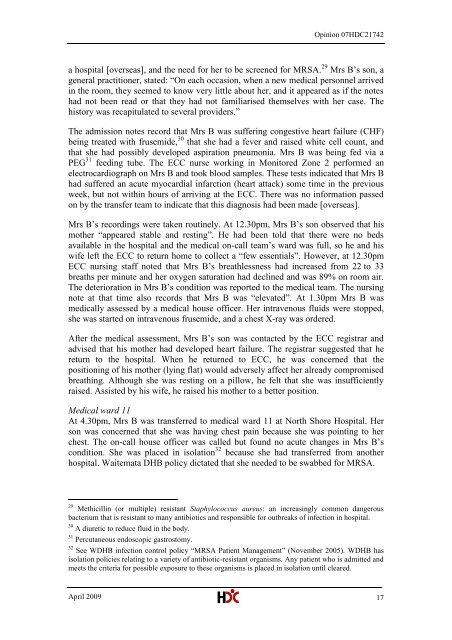North Shore Hospital report - New Zealand Doctor
North Shore Hospital report - New Zealand Doctor
North Shore Hospital report - New Zealand Doctor
You also want an ePaper? Increase the reach of your titles
YUMPU automatically turns print PDFs into web optimized ePapers that Google loves.
Opinion 07HDC21742a hospital [overseas], and the need for her to be screened for MRSA. 29 Mrs B‘s son, ageneral practitioner, stated: ―On each occasion, when a new medical personnel arrivedin the room, they seemed to know very little about her, and it appeared as if the noteshad not been read or that they had not familiarised themselves with her case. Thehistory was recapitulated to several providers.‖The admission notes record that Mrs B was suffering congestive heart failure (CHF)being treated with frusemide, 30 that she had a fever and raised white cell count, andthat she had possibly developed aspiration pneumonia. Mrs B was being fed via aPEG 31 feeding tube. The ECC nurse working in Monitored Zone 2 performed anelectrocardiograph on Mrs B and took blood samples. These tests indicated that Mrs Bhad suffered an acute myocardial infarction (heart attack) some time in the previousweek, but not within hours of arriving at the ECC. There was no information passedon by the transfer team to indicate that this diagnosis had been made [overseas].Mrs B‘s recordings were taken routinely. At 12.30pm, Mrs B‘s son observed that hismother ―appeared stable and resting‖. He had been told that there were no bedsavailable in the hospital and the medical on-call team‘s ward was full, so he and hiswife left the ECC to return home to collect a ―few essentials‖. However, at 12.30pmECC nursing staff noted that Mrs B‘s breathlessness had increased from 22 to 33breaths per minute and her oxygen saturation had declined and was 89% on room air.The deterioration in Mrs B‘s condition was <strong>report</strong>ed to the medical team. The nursingnote at that time also records that Mrs B was ―elevated‖. At 1.30pm Mrs B wasmedically assessed by a medical house officer. Her intravenous fluids were stopped,she was started on intravenous frusemide, and a chest X-ray was ordered.After the medical assessment, Mrs B‘s son was contacted by the ECC registrar andadvised that his mother had developed heart failure. The registrar suggested that hereturn to the hospital. When he returned to ECC, he was concerned that thepositioning of his mother (lying flat) would adversely affect her already compromisedbreathing. Although she was resting on a pillow, he felt that she was insufficientlyraised. Assisted by his wife, he raised his mother to a better position.Medical ward 11At 4.30pm, Mrs B was transferred to medical ward 11 at <strong>North</strong> <strong>Shore</strong> <strong>Hospital</strong>. Herson was concerned that she was having chest pain because she was pointing to herchest. The on-call house officer was called but found no acute changes in Mrs B‘scondition. She was placed in isolation 32 because she had transferred from anotherhospital. Waitemata DHB policy dictated that she needed to be swabbed for MRSA.29 Methicillin (or multiple) resistant Staphylococcus aureus: an increasingly common dangerousbacterium that is resistant to many antibiotics and responsible for outbreaks of infection in hospital.30 A diuretic to reduce fluid in the body.31 Percutaneous endoscopic gastrostomy.32 See WDHB infection control policy ―MRSA Patient Management‖ (November 2005). WDHB hasisolation policies relating to a variety of antibiotic-resistant organisms. Any patient who is admitted andmeets the criteria for possible exposure to these organisms is placed in isolation until cleared.April 2009 17
















